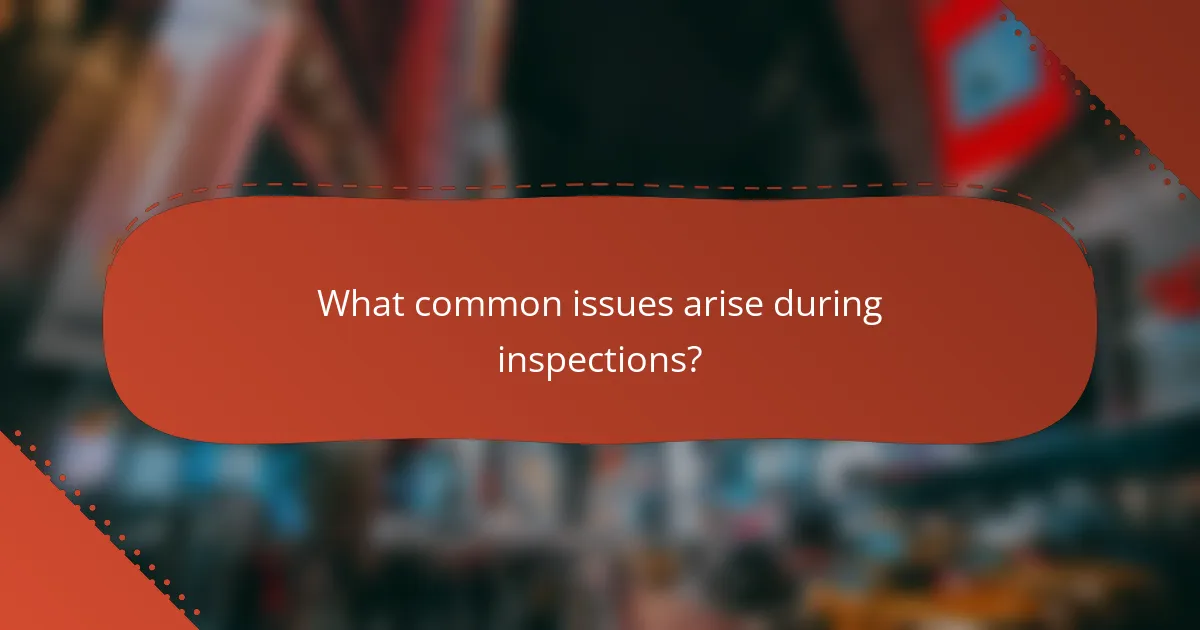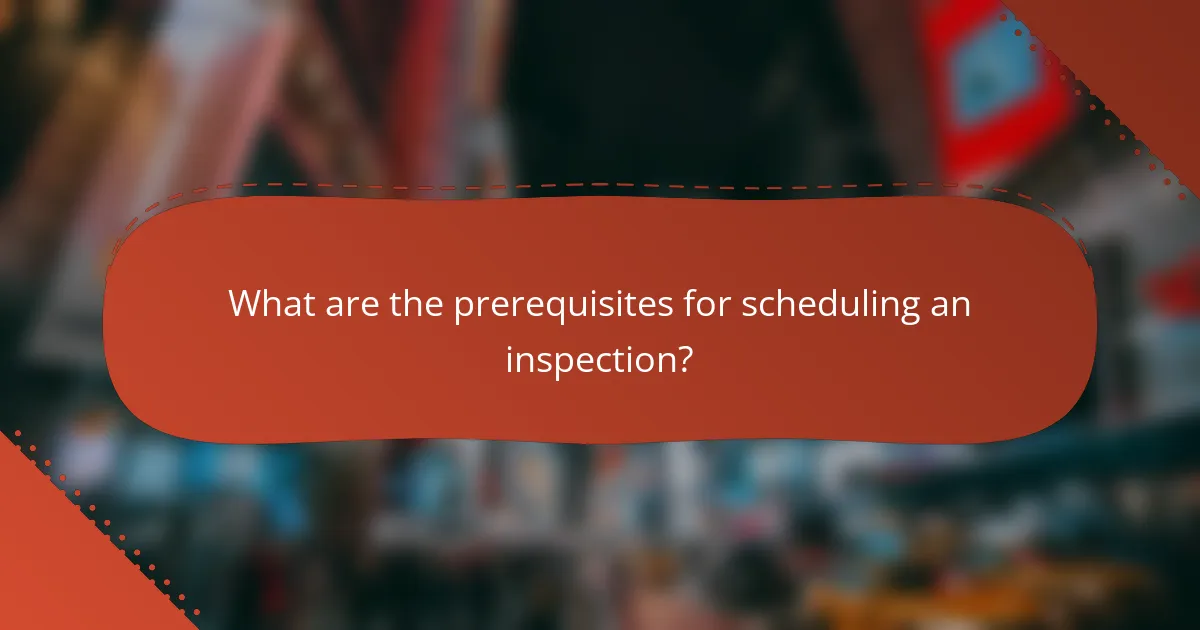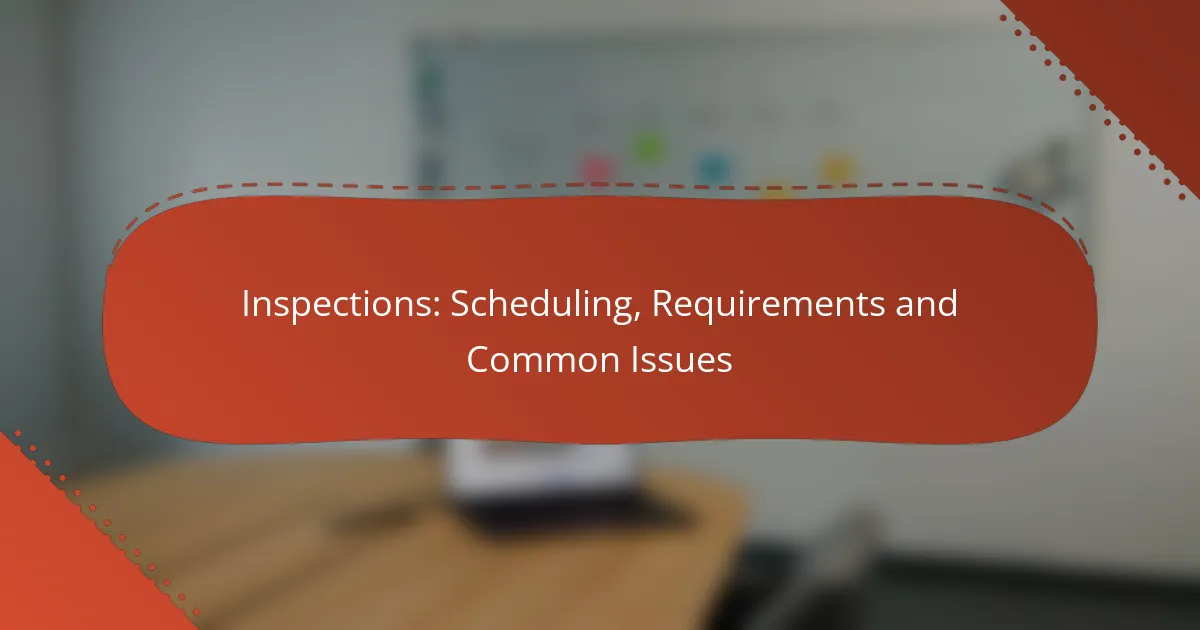Inspections are a critical aspect of ensuring compliance with local regulations and safety standards. Scheduling these inspections can vary widely depending on the location, with options including online platforms and phone calls. Understanding the specific requirements and potential issues, such as documentation discrepancies and communication breakdowns, is essential for a smooth inspection process.

How to schedule inspections in major US cities?
Scheduling inspections in major US cities typically involves using online platforms, phone calls, or mobile apps. Each method has its own advantages and can vary by location, so it’s essential to understand the options available in your area.
Online booking platforms
Many cities offer online booking platforms that allow residents to schedule inspections at their convenience. These platforms often provide a user-friendly interface where you can select the type of inspection, preferred date, and time slot. Examples include the City of New York’s Department of Buildings and Los Angeles’ Building and Safety website.
When using online platforms, ensure you have all necessary information ready, such as permit numbers or property addresses, to streamline the process. Check for any specific requirements or documentation needed for your inspection type.
Phone scheduling with local authorities
Phone scheduling remains a reliable option for arranging inspections, especially in cities where online services may be limited. Contact your local building department or inspection authority directly to schedule an appointment. Be prepared for potential wait times, as call volumes can vary.
When calling, have your details on hand, including the type of inspection needed and any relevant permits. This will help the representative assist you more efficiently.
Mobile apps for inspection scheduling
Some cities have developed mobile apps that facilitate inspection scheduling. These apps often provide features like reminders, status updates, and easy rescheduling options. Check if your city has an official app available for download on iOS or Android.
Using a mobile app can enhance convenience, allowing you to manage inspections directly from your smartphone. Look for apps with good user reviews to ensure reliability and ease of use.
Best times to schedule inspections
Scheduling inspections during off-peak hours can lead to quicker appointments. Early mornings or late afternoons are often less busy, increasing your chances of securing a preferred time. Avoid scheduling during peak seasons, such as spring and summer, when construction activity typically spikes.
Consider local holidays and events that may affect availability. Checking the inspection authority’s calendar for busy periods can help you plan effectively.
Inspection availability by region
Inspection availability can vary significantly by region due to differences in demand and local regulations. Urban areas may have more inspectors but also higher demand, leading to longer wait times. In contrast, rural areas might have fewer inspectors, which can affect scheduling flexibility.
Research your specific city or county’s inspection schedules and availability online or by contacting local authorities. This will provide you with a clearer picture of what to expect and help you plan accordingly.

What are the requirements for inspections in California?
In California, inspections are governed by specific requirements that ensure compliance with state laws and regulations. These requirements typically include licensing, necessary documentation, inspection fees, and adherence to health and safety regulations.
Licensing requirements
To conduct inspections in California, individuals must possess the appropriate licenses. This often includes a general contractor’s license or a specific trade license, depending on the type of inspection being performed, such as electrical or plumbing inspections.
Inspectors are also required to complete continuing education courses to maintain their licenses. This ensures they stay updated on the latest codes and regulations relevant to their field.
Documentation needed
Documentation is crucial for inspections in California. Inspectors typically need to provide proof of their licensing, insurance, and any relevant certifications. Additionally, they may require specific forms related to the inspection process.
Property owners should prepare documentation such as building plans, previous inspection reports, and any permits obtained for renovations or constructions. Having these documents ready can streamline the inspection process.
Inspection fees
Inspection fees in California can vary widely based on the type of inspection and the location. Generally, fees can range from a few hundred to over a thousand dollars, depending on the complexity of the inspection.
It’s advisable for property owners to inquire about the specific fees associated with their required inspections ahead of time to avoid unexpected costs. Some municipalities may offer fee schedules on their websites for transparency.
Health and safety regulations
Health and safety regulations in California are stringent and must be adhered to during inspections. Inspectors are responsible for ensuring that properties comply with local building codes, fire safety standards, and environmental regulations.
Property owners should familiarize themselves with these regulations to ensure their properties meet the necessary standards before an inspection. Non-compliance can lead to delays, fines, or the need for costly repairs.

What common issues arise during inspections?
Common issues during inspections include documentation discrepancies, non-compliance with local codes, inspection delays, and communication breakdowns. Addressing these problems proactively can streamline the inspection process and ensure compliance with regulations.
Documentation discrepancies
Documentation discrepancies occur when the paperwork submitted for an inspection does not match the actual conditions or requirements. This can include missing permits, incomplete forms, or inconsistencies in project plans.
To avoid these issues, ensure all documents are thoroughly reviewed and updated before the inspection. A checklist of required documents can help prevent oversights and ensure everything is in order.
Non-compliance with local codes
Non-compliance with local codes refers to failing to meet the specific regulations set by local authorities. This can involve safety standards, zoning laws, or building codes that vary by region.
To mitigate this risk, familiarize yourself with the local codes applicable to your project. Consulting with a local expert or inspector before the inspection can provide valuable insights and help identify potential compliance issues.
Inspection delays
Inspection delays can occur due to various factors, such as scheduling conflicts, incomplete preparations, or unforeseen issues during the inspection itself. These delays can lead to increased costs and project timelines.
To minimize delays, schedule inspections well in advance and confirm appointments with inspectors. Preparing the site and ensuring all necessary documentation is ready can also help facilitate a smoother inspection process.
Communication breakdowns
Communication breakdowns happen when there is a lack of clear information exchange between stakeholders, such as contractors, inspectors, and clients. Misunderstandings can lead to errors and delays in the inspection process.
Establishing clear lines of communication is essential. Regular updates and meetings can help ensure everyone is on the same page, reducing the risk of miscommunication and fostering a collaborative environment during inspections.

What are the prerequisites for scheduling an inspection?
Before scheduling an inspection, ensure that your property meets specific requirements, including readiness, compliance with local zoning laws, and the type of inspection needed. These factors are crucial for a smooth inspection process and can help avoid delays or complications.
Property readiness checklist
To prepare your property for inspection, create a checklist that includes essential items such as ensuring all utilities are operational, removing any debris, and providing clear access to all areas. Additionally, confirm that all necessary permits are in place and that any required repairs have been completed.
Common items on a property readiness checklist may include checking smoke detectors, ensuring proper ventilation, and confirming that all safety features are functional. Addressing these points can significantly enhance the likelihood of a successful inspection.
Local zoning laws
Understanding local zoning laws is vital before scheduling an inspection, as these regulations dictate what can be built or modified on a property. Familiarize yourself with the zoning requirements specific to your area, which can vary significantly between municipalities.
Check for any restrictions or requirements regarding property use, setbacks, and building heights. Non-compliance with zoning laws can lead to fines or the need for additional inspections, so it’s essential to verify that your property aligns with local regulations.
Inspection type determination
Determine the type of inspection required based on your property’s specific circumstances. Common inspection types include general home inspections, electrical inspections, plumbing inspections, and specialized inspections for pest control or environmental concerns.
Each inspection type may have different prerequisites and timelines, so understanding which inspections are necessary will help streamline the scheduling process. Consult with local authorities or a qualified inspector to ensure you are aware of all required inspections for your property.

How to choose the right inspection service?
Choosing the right inspection service involves evaluating local companies based on their reputation, customer feedback, and the services they offer. Prioritize those that meet your specific needs and comply with local regulations.
Comparing local inspection companies
When comparing local inspection companies, consider their experience, certifications, and areas of expertise. Look for companies that have been in business for several years and have a solid track record in your locality.
Check if they are licensed and insured, as this provides a layer of protection for you as a consumer. A good inspection company should also be familiar with local building codes and regulations.
Reading customer reviews
Customer reviews are invaluable when selecting an inspection service. Look for feedback on platforms like Google, Yelp, or local forums to gauge the experiences of previous clients.
Pay attention to recurring themes in reviews, such as punctuality, thoroughness, and customer service. A company with consistently positive feedback is more likely to meet your expectations.
Evaluating service packages
Service packages can vary significantly between inspection companies. Evaluate what each package includes, such as the types of inspections offered (e.g., home, commercial, environmental) and any additional services like radon testing or mold assessments.
Consider the pricing structure as well; some companies may offer flat rates while others charge based on square footage. Ensure that the package you choose aligns with your specific inspection needs and budget.
